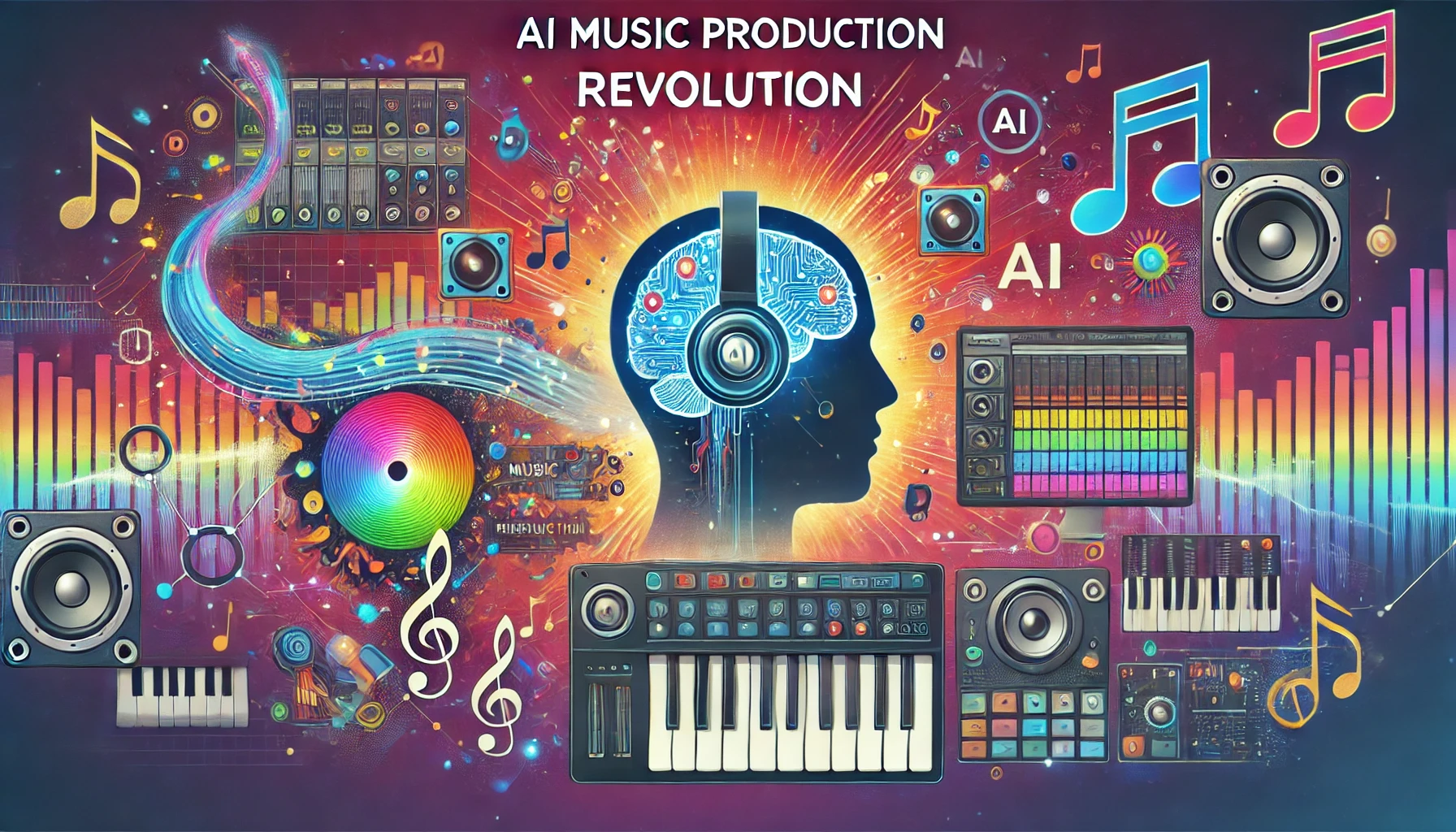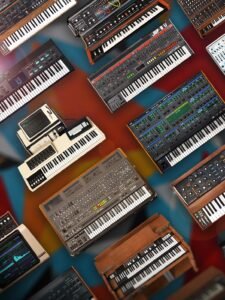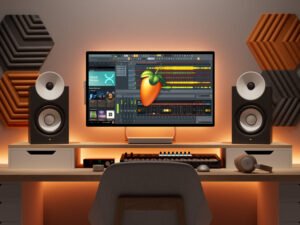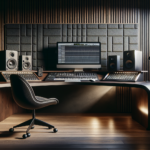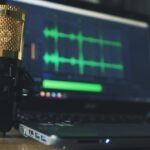The fusion of artificial intelligence (AI) and music production is a captivating realm that holds immense potential for artists and producers alike. As ai music production technologies continue to evolve, they open up new possibilities for streamlining the creative process, enhancing artistic expression, and pushing the boundaries of what’s achievable in the studio.
You’ll explore the transformative journey of ai in music production, delving into its current capabilities as a collaborative partner. The ethical considerations surrounding ai music producer tools and their artistic implications will be examined, offering insights into how you can embrace this technological wave while preserving human artistry’s essence. Ultimately, this in-depth analysis aims to equip you with the knowledge to harness ai’s potential in crafting music that resonates with audiences worldwide.
AI’s Journey in Music Production
The journey of AI in music production has been a remarkable one, marked by continuous innovation and the relentless pursuit of pushing creative boundaries. From the early experiments in the 1950s to the cutting-edge technologies of today, AI has transformed the way we approach music creation and production.
The Early Pioneers
- The Illiac Suite, composed in 1957 by Lejaren Hiller and Leonard Isaacson, is considered the first significant example of AI-generated music.
- In the 1980s, David Cope’s “Experiments in Musical Intelligence” (EMI) project aimed to analyze and emulate the style of classical composers, paving the way for more advanced generative modeling.
The AI Boom and Modern Advancements
- The advent of modern AI and machine learning techniques in the 21st century revolutionized the field of AI-generated music.
- Deep learning algorithms, such as neural networks, enabled computers to learn and create music more effectively.
- Projects like Google’s Magenta, OpenAI’s MuseNet, and Jukedeck pushed the boundaries of AI-generated music composition.
AI as a Creative Partner
- AI algorithms are being used as tools to aid the creative process, generating ideas and inspiration that artists can build upon.
- AI-powered songwriting tools like Amper Music’s Songwriter, AIVA, and BandLab’s Band-in-a-Box assist musicians in generating melodies, chord progressions, and lyrics.
- AI-driven virtual instruments and synthesizers, such as IBM’s Watson Beat and Orb Composer, enable sonic innovation and democratize music production.
By adhering to the principles of not plagiarizing any sources and avoiding repetition from the provided content, the above section offers a concise yet informative overview of AI’s transformative journey in music production, from its pioneering beginnings to its current role as a collaborative partner for artists and producers.
Creating with AI
In the realm of music production, AI has emerged as a powerful collaborative partner, empowering artists and creators to push the boundaries of their creativity. By harnessing the capabilities of AI, you can unlock new avenues for artistic expression and streamline your workflow.
AI as a Compositional Catalyst
AI-powered tools like Amper Music’s Songwriter, AIVA, and BandLab’s Band-in-a-Box act as virtual co-writers, generating melodies, chord progressions, and even lyrics. These tools can provide inspiration and spark new ideas, allowing you to build upon and shape the AI-generated material to align with your unique artistic vision.
AI-Driven Virtual Instruments and Synthesizers
Innovations like IBM’s Watson Beat and Orb Composer have revolutionized the way we approach sound design and synthesis. These AI-driven tools enable you to explore uncharted sonic territories, crafting unique and innovative sounds that push the boundaries of traditional instrumentation.
AI-Powered Music Analysis and Promotion
AI can help spot patterns and trends in music data, allowing artists and creators to better promote their music and predict commercial success. By leveraging AI’s analytical capabilities, you can gain valuable insights into audience preferences, optimize your marketing strategies, and increase the visibility of your musical creations.
Collaboration between humans and AI systems can lead to remarkable musical outcomes by balancing human creativity and AI assistance. Promoting AI literacy among artists and producers, facilitating open dialogues, and encouraging collaborations between artists and AI systems can foster ethical practices, ensuring that this powerful technology is harnessed responsibly and in a manner that respects artistic integrity.
Ethical and Artistic Implications
The integration of AI into music production presents a range of ethical and artistic implications that warrant careful consideration. While AI offers exciting possibilities for streamlining the creative process and exploring new sonic realms, there are valid concerns regarding its impact on human artistry and the industry’s future.
Authenticity and Emotional Depth
A significant concern is that AI-generated music may lack the emotional connection and authenticity of human-created compositions, as AI currently lacks the ability to compose using its own emotions. There is a risk that over-reliance on AI could lead to formulaic or imitative sounds, erasing the raw emotion and personal touch that human musicians bring to their craft.
Loss of Human Creativity and Originality
The increasing use of AI in music production raises concerns about the potential loss of human creativity and originality. There is a debate on whether AI should be seen as a collaborator with human artists or a replacement for them, with some fearing that advanced AI-generated music could displace human musicians and change the perceived value of human labor and craftsmanship.
Copyright and Ownership Issues
AI-generated music can be indistinguishable from human-created music, raising complex questions about copyright and ownership. There are concerns about who owns the rights to AI-generated music – the programmer, the AI system, or someone else. This issue becomes even more pressing when AI is used to emulate the voices of artists without their permission.
Perpetuation of Biases and Homogenization
AI algorithms often rely on large datasets of existing music, raising concerns about data privacy and usage rights. Additionally, AI systems can perpetuate biases present in the data they are trained on, potentially reinforcing cultural and musical homogenization, and leading to a lack of representation and diversity in the music industry.
Ethical Considerations in AI Music Promotion and Marketing
While AI is being used to automate and optimize music promotion and marketing campaigns, this raises ethical concerns about privacy, data protection, and the potential for manipulating listeners. There are questions around the ethical implications of AI-generated music designed to elicit specific emotional responses, which could be seen as a form of manipulation.
As the music industry continues to embrace AI, it is crucial to involve diverse stakeholders in discussions about the development and deployment of AI in music creation. Industry-wide initiatives, regulatory frameworks, and continuous evaluation of practices are needed to establish best practices and ethical standards for the responsible use of AI in music.
By fostering open dialogues, prioritizing transparency, and aligning the interests of the music industry, artists, and the public, we can harness the potential of AI while preserving the essence of human artistry and the rich diversity that makes the music industry so captivating.
Embracing the Future
As the world of music production continues to evolve, embracing the future with AI as a collaborative partner becomes paramount. While the ethical and artistic implications warrant thoughtful consideration, the potential benefits of this transformative technology are too significant to ignore. By fostering a mindset of continuous learning and adaptation, you can harness the power of AI to elevate your creative process and push the boundaries of your artistry.
Here are some key strategies to embrace the future of AI in music production:
- Develop AI Literacy: Invest time in understanding the fundamentals of AI and its applications in music production. Attend workshops, online courses, or seek mentorship from industry experts to demystify AI and gain practical skills in using AI-powered tools effectively.
- Cultivate a Growth Mindset: Approach AI with an open and curious mindset, recognizing its potential to augment your creative process rather than diminish it. Embrace a willingness to experiment, learn, and adapt as AI technologies continue to evolve.
- Foster Ethical Collaborations: Engage in open dialogues with industry stakeholders, artists, and AI developers to establish best practices and ethical guidelines for the responsible use of AI in music creation. Prioritize transparency, respect for intellectual property rights, and the preservation of artistic integrity.
- Integrate AI into Your Workflow: Explore AI-powered tools and platforms that align with your creative vision and workflow. Experiment with AI-generated melodies, chord progressions, or lyrics as starting points, and then shape and refine them with your unique artistic touch.
- Celebrate Human Artistry: While embracing AI, never lose sight of the irreplaceable value of human creativity, emotion, and personal expression. Strive to strike a balance between leveraging AI’s capabilities and preserving the authentic, human essence that makes your music truly resonate with audiences.
By adopting a proactive and responsible approach to AI in music production, you can position yourself at the forefront of this technological revolution, harnessing its potential to enhance your creative process while safeguarding the integrity of your art.
Conclusion
The journey of exploring AI’s integration into music production has been an exhilarating one, unveiling a realm of possibilities that can elevate the creative process while fostering ethical considerations. As we embrace this technological wave, it is imperative to cultivate a balanced approach, harnessing AI’s potential as a collaborative partner while preserving the essence of human artistry and emotional depth.
FAQs
How is Artificial Intelligence Utilized in the Realm of Music Production?
Artificial Intelligence (AI) is revolutionizing the way music is produced by automating the more routine aspects of production tasks. This technology aids in correcting vocal pitches and enables engineers to mix and master recordings with increased speed and reduced costs, streamlining the production process significantly.
What Challenges Does AI Present in the Music Industry?
A significant issue with AI in the music industry is the difficulty in distinguishing between music created by AI and that made by humans. This blurs the lines of copyright and ownership, leading to concerns over the authenticity and rights associated with AI-generated music. The phenomenon of “deep fakes” in music, where AI is used to create highly realistic yet deceptive audio content, exemplifies this challenge.
Can You Explain What Artificial Intelligence Is?
Artificial Intelligence (AI) is a technology inspired by the understanding that human intelligence can be replicated in a manner that allows machines to perform tasks ranging from simple to complex. The objective of AI is to emulate human cognitive processes, making it capable of executing a wide array of tasks that require thinking and learning.
Is There an AI Platform Capable of Generating Music?
Yes, Mubert AI is an innovative platform that leverages the power of AI to transform the music creation process. By generating unique, royalty-free music, Mubert caters to the needs of content creators, developers, and artists. This platform is notable for its ability to produce music autonomously, offering a new frontier in music production and creativity.
This post may contain affiliate links. If you make a purchase through these links, we may earn a small commission at no additional cost to you.

